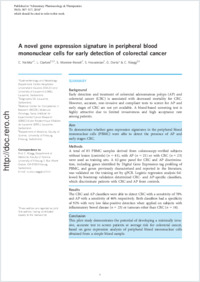A novel gene expression signature in peripheral blood mononuclear cells for early detection of colorectal cancer
- Nichita, C. Gastroenterology and Hepatology Department, Centre Hospitalier Universitaire Vaudois (CHUV) and University of Lausanne (UNIL), Lausanne, Switzerland
- Ciarloni, Laura Diagnoplex SA, Lausanne, Switzerland - National Center for Competence in Research (NCCR), Molecular Oncology, Swiss Institute for Experimental Cancer Research (ISREC)-Ecole Polytechnique Fédérale de Lausanne (EPFL), Lausanne, Switzerland
- Monnier-Benoit, S. Diagnoplex SA, Lausanne, Switzerland
- Hosseinian, S. Diagnoplex SA, Lausanne, Switzerland
- Dorta, Gian Gastroenterology and Hepatology Department, Centre Hospitalier Universitaire Vaudois (CHUV) and University of Lausanne (UNIL), Lausanne, Switzerland
- Rüegg, Curzio National Center for Competence in Research (NCCR), Molecular Oncology, Swiss Institute for Experimental Cancer Research (ISREC)-Ecole Polytechnique Fédérale de Lausanne (EPFL), Lausanne, Switzerland - Department of Medicine, Faculty of Science, University of Fribourg, Switzerland
-
2014
Published in:
- Alimentary Pharmacology & Therapeutics. - 2014, vol. 39, no. 5, p. 507–517
English
Background: Early detection and treatment of colorectal adenomatous polyps (AP) and colorectal cancer (CRC) is associated with decreased mortality for CRC. However, accurate, non-invasive and compliant tests to screen for AP and early stages of CRC are not yet available. A blood-based screening test is highly attractive due to limited invasiveness and high acceptance rate among patients.Aim: To demonstrate whether gene expression signatures in the peripheral blood mononuclear cells (PBMC) were able to detect the presence of AP and early stages CRC.Methods: A total of 85 PBMC samples derived from colonoscopy-verified subjects without lesion (controls) (n = 41), with AP (n = 21) or with CRC (n = 23) were used as training sets. A 42-gene panel for CRC and AP discrimination, including genes identified by Digital Gene Expression-tag profiling of PBMC, and genes previously characterised and reported in the literature, was validated on the training set by qPCR. Logistic regression analysis followed by bootstrap validation determined CRC- and AP-specific classifiers, which discriminate patients with CRC and AP from controls.Results: The CRC and AP classifiers were able to detect CRC with a sensitivity of 78% and AP with a sensitivity of 46% respectively. Both classifiers had a specificity of 92% with very low false-positive detection when applied on subjects with inflammatory bowel disease (n = 23) or tumours other than CRC (n = 14).Conclusion: This pilot study demonstrates the potential of developing a minimally invasive, accurate test to screen patients at average risk for colorectal cancer, based on gene expression analysis of peripheral blood mononuclear cells obtained from a simple blood sample.
- Faculty
- Faculté des sciences et de médecine
- Department
- Médecine 3ème année
- Language
-
- English
- Classification
- Biological sciences
- License
-
License undefined
- Identifiers
-
- RERO DOC 209501
- DOI 10.1111/apt.12618
- Persistent URL
- https://folia.unifr.ch/unifr/documents/303396
Statistics
Document views: 180
File downloads:
- pdf: 215
